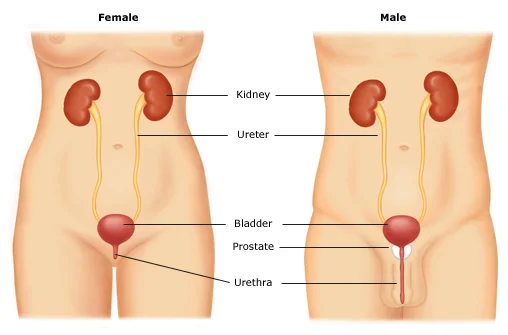I can feel your mental groan as you think about UTIs. They can be painful and just plain suck. But let's go over the basics that you need to know.
1. What is a UTI?
UTI stands for urinary tract infection. Normal pee is sterile- that means it doesn't have any bacteria in it. Your mouth, intestines, vagina & anus have a normal population of bacteria. Any activities which spread this bacteria from its normal home can cause a UTI.
Female anatomy makes us more prone to infection than men. A women's urthera (the tube through which your pee comes out) is only 4cm long in women and 20cm in men. That's the difference between the bacteria having to run a 5k vs a marathon to infect you!
50-80% of women will get a UTI at some point in their lives. Another 1/3 of these women will have recurring UTIs which means 2+ infections in 6 months or 3+ in 1 year. Most of these recurrences are a result of getting infected again, not because of failed antibiotic treatment.
2. The signs and symptoms
Common symptoms of a UTI include: painful or difficult peeing (dysuria), increased frequency, having to go suddenly (urgency), or being unable to go (hesitancy). You may also see blood in your pee (hematuria) and/or have pain around your bladder.
3. What's sex got to do with it?
So much!!
Women with recurring UTIs are 10x more likely to have had sex 9+ times/month in the last year compared to women who didn't have a UTI in the past year. Having sex with a new partner or using spermicides may also increase your chance of getting a UTI.
Which leads us into a common question...
4. Does peeing after sex prevent UTIs?
The research so far has shown that peeing after sex does NOT decrease your chance of getting a new or recurring UTI. Most doctors still recommend this practice because its an easy and low risk method which may be preventative.
This recommendation makes sense because sex temporarily increases the number of bacteria in your pee for up to 24 hours. But if that's the case then how come every single woman doesn't get a UTI every time she has sex?
Researchers are working on it. So far we know that genetics may play a role here. Talk to your mom about this pesky problem- a maternal history has been found to increase your chances of having recurring UTIs.
5. The almighty cranberry juice
We've all heard this right? It's not based on rumor. This info came from a 1984 study which identified cranberry juice as a preventative measure for UTIs. Cranberry juice makes it harder for bacteria to stick to the wall of the urethra.
But what shocked me is the info we don't talk about from this study. The women drank 10oz of cranberry juice daily and it took 6-8 weeks of this before the protective effect kicked in. That's a looottt of juice!
6. What can you do about it?
I did a super quick, informal search of "UTI." You know what the most common result was? Home remedies for UTI. I'm all for natural cures over medicine- if there's research behind it.
Many of these sites recommend drinking or eating different foods which are supposed to clear the urinary tract. The best tip is to stay hydrated. Remember that super concentrated urine (from dehydration) acts as a bladder irritant... and a UTI does not need any help to be more irritating.
As for the homemade salves/baths, etc, be cautious here too. These concoctions and soaks may change the pH of your vagina or act as an irritant to the sensitive skin of your vulva (the skin around your urethra and vagina).
An untreated UTI can spread up into the ureters or kidneys. Those are serious conditions, so don't "just ignore it" and chug cranberry juice for a week. If this is the first time you suspect you may have a UTI, your symptoms are different than the last time you had a diagnosed UTI or they are getting worse, see your MD/Gyno.
A 3 to 7 day course of antibiotics usually does the trick. Your doctor may take a urine sample to identify the specific bacteria which you have been infected with to select the best antibiotic for treatment. If you are experiencing recurrent infections, talk with your doctor about your sexual habits, a low dose preventative (prophylactic) antibiotic, and probiotics.
7. Red Flags
I couldn't end an article about UTIs without including this section. Do not pass GO, do not collect $200. If you begin experiencing any of these symptoms get yourself to a MD/Gyno ASAP:
- If there's blood in your pee. While this could be a symptom of a UTI, it could be from a variety of other causes as well so be sure to report it to your doctor.
- Your symptoms don't get better or get worse while you are being treated.
- Fever/Chills: these could be a sign of a bigger, more widespread infection. Your simple run of the mill UTI doesn't cause fever.
- Vomiting: unless you drank a pitcher of margaritas by yourself the night before, this could be one of those spreading infections we talked about.
- Severe, sudden pain in your mid to low back: this may be a sign that the infection has spread up into your kidneys. This is a serious condition which requires immediate medical attention.
Do you have any other questions about UTIs?
Resources
Diagnosis and Management of Recurrent Urinary Tract Infections in Non-Pregnant Women. British Medical Journal, 2013.
Urinary Tract Infection Pathogenesis: Host Factors. Infectious Disease Clinics of North America, 2014.











